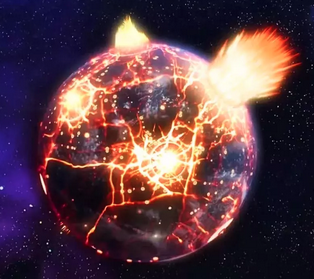Although the linked study examined attitudes of those 16 to 25 years of age, there are many outside that range (myself included) who experience extreme pessimism about the future of human existence.
What experiences led you to your own conclusions about the fate of humanity? Do those conclusions affect your everyday decisions? How does your acceptance of imminent calamity shape your long term goals?
I’ll start. I was but a child in the 1960’s (Boomer II), born into a family deeply involved in charismatic Christianity. Fear surrounding the predicted events of a highly anticipated second coming of Christ (The Rapture, Tribulation, etc.) combined with the exaggerated cultural threat of communist aggression and the certainty of thermonuclear destruction created a perfect storm of personal despair and dread by the time I was 9 years old. As the fundamentalist Christian culture edged toward prosperity gospel and Seven Mountains, my mind turned towards nihilistic and scientific literature.
By my teenage years, I was solidly convinced that nothing short of a miracle could save humanity prior to my 30th birthday. Yet, here we are. The angst of my childhood absolutely shaped the trajectory of my life. Secondary education seemed a senseless enough endeavor to ignore. I considered reproduction to be a cruel endeavor. I embraced agnosticism, punk culture and anarchism.
The privileged existence of being white, privileged and cis male has served me well, and I can’t say that I’m unhappy. I find succor in the growing probability that a natural death will spare me the majority of horrors to come. And I am sad and angry for what subsequent generations are about to experience.
What’s your story?


I’m convinced that there is no way to avoid a climate induced environmental collapse, and there never was. The entirety of our evolution has been a competition for resources where the winner reproduces their genes better than the loser. Fossilized carbon is the most valuable resource the planet has to offer. It powered the industrial revolution and provided the energy to create the society we live in today. And it fueled the largest growth in human population in history. We compete bitterly with each other (on a national level) to have access to fossil fuels. And any group of us who decides to reduce their usage for the benefit of the earth will simply be allowing another group to use ‘their’ share of fossil fuels. And the altruistic group will suffer while watching the other group prosper. We don’t have the ability as a species to think ahead for the good of the planet. It’s never been a useful survival strategy. It’s our nature to compete, each of us wanting more for ourselves or our group, regardless of the consequence for others. So we will continue to extract and burn until it’s no longer possible. I see no alternative.
As far as how I come to this conclusion, it’s hard to say. I think there is a logical thread here that leads me to a reasonable, if pessimistic, conclusion. Maybe something in my history killed my faith in the collective good of humankind. Maybe game theory points this way. Not sure. I want to say my opinions and observations are self-evident, but probably everyone thinks that about their own ideas.